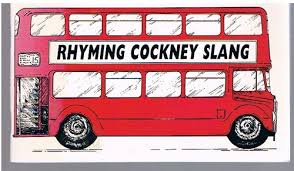 Back in the “good old” Sacramento days when I wasn’t good and I wasn’t old, my pals and I never got tired of Lefty Daugherty entertaining us with funny little rhymes that rolled off his tongue in oddly accented English that sounded like Eliza Doolittle’s father in My Fair Lady: “Your rattles and jar, that’s your car. Your trouble and strife, that’s your wife. A hit and a miss, that’s a piss. Dog’s meat, that’s your feet.” Between hilarity and curiosity I soon found out he wasn’t making this stuff up but rather carrying on the tradition of rhyming Cockney slang that’s now almost two hundred years old.
Back in the “good old” Sacramento days when I wasn’t good and I wasn’t old, my pals and I never got tired of Lefty Daugherty entertaining us with funny little rhymes that rolled off his tongue in oddly accented English that sounded like Eliza Doolittle’s father in My Fair Lady: “Your rattles and jar, that’s your car. Your trouble and strife, that’s your wife. A hit and a miss, that’s a piss. Dog’s meat, that’s your feet.” Between hilarity and curiosity I soon found out he wasn’t making this stuff up but rather carrying on the tradition of rhyming Cockney slang that’s now almost two hundred years old.
The most outstanding feature of the Cockney accent is the absence of the “h” sound: “Ow, me ‘ead ‘urts!” And yes, they really do say “me” instead of “my”. You won’t catch a Cockney saying, “My girlfriend broke my heart”, but he might say, “The cheese broke me ‘eart.” The cheese?? Sure, you know—that rhyming thing again: cheese and kisses that’s your “missus” (wife or girlfriend). With a little practice, you too can learn to speak Cockney-style! Just check out the on-line tutorial “Learn the Cockney Accent with Jason Statham”. Jason gets in your face with his demonstration of the dialect, and that essential insouciance that goes along with it, for a spell-binding 7.27 minutes. At the end of that crash course you could give it a try, but be forewarned—the British, and Londoners in particular, think we Americans sound ridiculous-bordering-on-pathetic when we try to imitate any of the accents of the Kingdom.
Excerpt from the chapter “It’s All Bubble and Squeak to Me” in Wordstruck! The Fun and fascination of Language.
